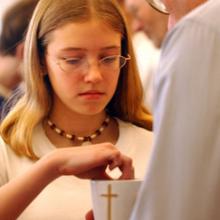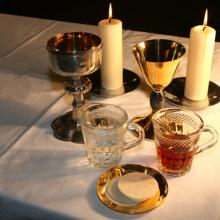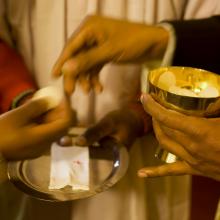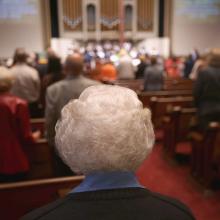Communion
Pope Francis and his bishops got a wake-up call Oct. 7 from a Wisconsin couple who said the Catholic Church was failing to deal with the collapse of the traditional family.
Jeff and Alice Heinzen of La Crosse told the pope and 180 bishops attending a synod devoted to family issues that they were alarmed by the number of young people born out of wedlock or living with divorced parents.
The couple are one of 14 married couples invited to give their testimony.
“We have seen the number of marriages decline each year and the rate of cohabitation increase,” said the Heinzens, who have been married 34 years. “We know countless divorced adults who have joined other faith communities because they do not feel welcomed in the Catholic Church.”
What’s more, the couple added, the church’s pastoral programs were failing to address the forces impacting marriage and family life.
Leading up to a Vatican summit on family life that Pope Francis opens on Oct. 5, high-ranking churchmen have fiercely debated church teaching — and criticized each other — in sharp exchanges that offer a ringside seat to the kind of battles that Rome used to keep under wraps.
But amid all this verbal sparring, the opposing camps have found one point of consensus: Airing their differences is good for the Roman Catholic Church.
“Everybody is free to express his opinion. That is not a problem for me,” Cardinal Walter Kasper, a German theologian who has emerged as the point man for the reformists, said in an interview published Sept. 29 in America magazine.
“The pope wanted an open debate, and I think that is something new because up to now often there was not such an open debate. I think that’s healthy and it helps the church very much.”
A day later, Cardinal Raymond Burke, an American who heads the Vatican’s highest court and a vocal exponent of the conservative camp opposing Kasper, spoke to reporters to toss back a few barbs. But he, too, praised the frankness of the exchanges.
Public disagreements over whether the Roman Catholic Church can change its teachings on Communion for remarried Catholics are growing sharper on the eve of a major Vatican summit, with conservatives led by U.S. Cardinal Raymond Burke making another push against loosening the rules.
In a conference call with reporters on Sept. 30, Burke, who currently heads the Vatican’s high court, singled out the leading proponent of reforms, German Cardinal Walter Kasper, and his claims that critics of his proposals are really attacking Pope Francis.
Kasper has said that the pope supports his efforts to find ways to fully reintegrate divorced and remarried Catholics into church life. The proposals have become a prime focus of the upcoming Vatican meeting, called a synod, which will convene on Oct. 5 for two weeks to consider changes in family life in the modern world.
“I find it amazing that the cardinal claims to speak for the pope,” said Burke, the former archbishop of St. Louis, speaking from Rome. “The pope doesn’t have laryngitis. The pope is not mute. He can speak for himself. If this is what he wants, he will say so.”
Pope Francis made headlines this week when he officiated at the weddings of 20 couples, including some who had been living together and a woman who has a daughter from a previous relationship.
It was the first time that the Argentine pontiff had presided over a marriage ceremony since his election and it may have also signaled a dramatic shift in Catholic Church doctrine.
Now five conservative cardinals appear to be hitting back.
In a new book to be released days before the world’s Catholic bishops gather at the Vatican for their October Synod, the hard-liners are challenging moves to moderate church doctrine on marriage and offer Communion to divorced Catholics who remarry.
The book, Remaining in the Truth of Christ: Marriage and Communion in the Catholic Church, will be published in five languages, including English and Italian, on Oct. 1.
Faced with a cultural landscape that’s shifting faster than the church’s ability to keep up, Catholic bishops are looking for new approaches toward unmarried couples, divorced people, and single parents who are disillusioned with the church.
The first-ever survey of 114 bishops’ conferences around the world found that many Christians “have difficulty” accepting church teachings on key issues such as birth control, divorce, homosexuality, and cohabitation.
But one senior church leader cautioned that “the doctrine of the church is not up for discussion.”
The survey’s findings, released in a 75-page document by the Vatican on Thursday, will serve as the blueprint for October’s Synod of Bishops, when bishops from around the world will gather to discuss issues facing the family.
Anyone who thinks much on theology will tell you that you go through patterns of thought. For a long time, I was intrigued — and still am in many ways — by the notion of Jesus as a “third way” prophet, offering something different than both church and secular culture most of the time. As I learned of different interpretations of the crucifixion, I became obsessed with nonviolent activism, and the idea of responding to force or bloodshed with something else entirely.
Now, my latest mental track is sacrament. I am interested in what makes something a sacrament, yes, but also in the power connected to sacraments and what human beings do with that power.
I am part of the Christian Church (Disciples of Christ), a denomination that has Alexander Campbell as part of its roots. Campell was notorious for supposedly causing a stir in his local church around the sacrament of communion. At that time, the Church handed out tokens to those it deemed worthy to participate in communion. No token? No communion. So this one particular day, Campbell entered the church with his token in hand, but when they offered the elements to him, he refused, tossing the token on the ground and walking out. He went on to help start the Disciples based, in large part, on the concept of the open communion table.
ELIZABETH PALMBERG—Zab to her friends—says her motto is “Cherish each moment, even the ones that suck.”
Nine years ago, she was diagnosed with Hodgkin’s lymphoma. She has had her ups and downs in her battle against cancer, but many moments in that journey have undeniably sucked.
In 2001, Zab was a college professor in California when she applied to be an intern at Sojourners. We decided her Ph.D. (in Victorian literature) perhaps qualified her to do the data entry and fact-checking work required of our editorial intern, and when her yearlong internship was over we invited her to become a full-time member of the editorial staff.
She’s been gracing us, and our readers, with her brilliant analysis and quirky wit ever since. Her knowledge, passion, and insight informed and often challenged those of us who’ve worked closely with her—and led to outside recognition as well. In 2011, for instance, Zab joined a Witness for Peace delegation to Colombia, visiting communities engaged in the difficult work of peacebuilding and conflict resolution. Her report on the trip—the last feature she wrote for the magazine—was honored by the Associated Church Press as the best news article of the year.
In November 2012, she wrote on her blog, “Just as I was planning a big six-year hey-they-cured-my-cancer party, it turned out I have cancer again.” Months of difficult treatment followed, and she chronicled the good times and the bad with (most of the time) her sense of humor firmly intact. For instance, she wrote that “technically, the exact wrong thing to read [during chemotherapy] is Thomas Hardy’s Jude the Obscure, which also happens to be the wrong thing to read in almost *every* context—that book really puts the “ick” in ‘Victorian.’ My deepest apologies to the one class I forced to read it. I don’t know what I was thinking.”
Interesting fact: The term “breaking bread” goes back many centuries and crosses many cultures and religions. It’s a shared term for coming together in meal and friendship. The term applies today — you can find it in some urban dictionaries.
For as long as we’ve been around, we’ve come together and connected over a meal. We enjoy breaking bread and telling stories, restoring friendships, and creating new ones.
Bread has been a staple of diets for a long time, so it’s a natural choice to capture the essence of eating together. Also, it’s wonderfully symbolic. When we break bread, each of us gets one piece of a bigger loaf. It feeds our sense of connection.
It’s not surprising that bread-breaking is a touchstone religious practice. For instance, it’s part of Jewish tradition. Two thousand years ago, a Jewish rabbi chose it as a way for his followers to remember their unity.
Jesus spent the last years of his life teaching that everyone is responsible for everyone else and must live that way — feed the hungry, give drink to the thirsty, heal the sick, visit the imprisoned, care for the poor. Breaking bread is a reminder that our lives are about more than ourselves.
IN HER LATEST book, Sara Miles—author of the spiritual memoirs Take This Bread and Jesus Freak—goes where traditional and liturgical churches don’t regularly go: into the streets to push the boundaries of public worship. City of God chronicles a day in the life in San Francisco’s Mission District, on one Ash Wednesday when Miles and others from St. Gregory of Nyssa Episcopal Church offer “Ashes to Go,” a growing national movement within the Episcopal Church to perform the imposition of ashes outside the church walls on the first day of Lent.
Ash Wednesday works on the street because it has a broad ability to speak to people with “different beliefs about God and very different relationships to the church.” Even so, carrying the observance away from the altar has generated critics. Some liturgists have wondered if, without a proper church context, “the ashes become a meaningless affirmation of our earthly life,” or whether regular folks on the street can really appreciate the profundity of the human condition and mortality without the church to explain it to them. Trusting that people on the street will “get it,” Miles embarked on a day of crossing the traditional borders of worship space to smudge foreheads in McDonald’s, taquerias, hair salons, and botanicas.
Miles finds that traditional observance of liturgies such as Ash Wednesday helps reclaim the public language of sin and repentance in a progressive way. This kind of re-evaluation of sin in common life led her to realize how she’s also fallen short of the call to solidarity and deep communion with the city. “I aspired to be the kind of neighbor who knew everyone,” she writes, “I yearned to be in real relationship.” But her admittedly self-satisfied sense of fellowship didn’t match up to her interactions. She hadn’t even bothered to learn the last name of a young Latino activist on her block and confesses, “I prayed for my neighbors, but not so much with them, and it made me uncomfortable.”
Tuesday was a big day here in Washington, D.C. The president of the United States addressed both houses of Congress and the Supreme Court, laying out his State of the Union. In this annual speech, the President lays out his vision of where the country is at, and where we are headed. With great pomp and circumstance, the Commander-in-Chief delivers a message for the whole nation.
Tuesday night was a big moment for my community, too. The D.C. small group of Friends of Jesus gathered for our first small group meeting of 2014. We caught up with one another after many weeks apart. We experienced the story of Acts 2 in the form of a bibliodrama that we acted out together. We shared a time of deep worship and prayer.
While the first months of Pope Francis’ pontificate have been marked by his attention to the poor and his “Who am I to judge” attitude on homosexuality, his pledge to tackle the ban on Communion for divorced and remarried Catholics could have the biggest impact for Catholics in the pews, especially in the U.S.
The current policy has caused what some call a “silent schism,” and bishops around the world concede that the ban has alienated untold numbers of Catholics and their families.
“I think this is the moment for mercy,” Francis told reporters when asked about remarried Catholics during a wide-ranging news conference on the plane back to Rome from Brazil in July.
Like the gay issue, Francis seems to favor a more pastoral approach to the equally perplexing question of “invalid” marriages — couples who remarry outside the church without getting an annulment, or those who do not get married in church in the first place.
As online worship becomes more common in some churches, leaders within the United Methodist Church are debating whether the denomination should condone online Communion.
About 30 denominational leaders met last week after Central United Methodist Church in Concord, N.C., announced plans to launch an online campus that potentially would offer online Communion. Some nondenominational churches already offer online Communion, according to United Methodist News Service, but leaders urged the denomination’s bishops to call for a moratorium on the practice and do further study of online ministries.
The majority of the leaders agreed with the statement that Communion “entails the actual tactile sharing of bread and wine in a service that involves people corporeally together in the same place.” Not everyone, however, agreed that congregants must be in the same place.
VATICAN CITY — Since mid-July, Pope Francis has been using Communion wafers made by an Argentine prisoner in the daily Mass he celebrates at the Vatican’s Santa Marta residence.
The hosts are made by Gabriela Caballero, a 38-year-old woman who is serving a seven-year jail term in the San Martin Penitentiary outside Buenos Aires.
Her story was revealed by the Argentine news agency NOVA and picked up by Il Sismografo, a blog with close connections to the Vatican.
Caballero gave the hosts, together with a long letter to the pope, to Bishop Oscar Ojea of San Isidro, who regularly visits the prison. Ojea, in turn, delivered the hosts to the pope on July 16 during a visit to the Vatican.
Francis began using the hosts on July 18; the day after he wrote back to Caballero, thanking her for the gift.
As I waited in the room heated to 105 degrees, my friend Molly looked for a sliver of floor space for her yoga mat. “I probably need a more relaxing type of yoga,” I whispered, almost apologizing for bringing my type-A body to the crowded Bikram class, known for its intense heat and addictive practitioners.
At exactly 10 a.m., the yoga teacher entered the room: I stood in unison with the other students, much like I rise for the procession at my church on Sundays. Surprisingly, much of what draws me to Bikram yoga also brings me back each week to the Episcopal church.
So you’ve heard the flu shot is somewhat ineffective this year, and, though you have a normal immune system, you don't want to take the Eucharist from a common chalice.
Part of me kind of wants to slap you.
Obviously, that's not what Jesus would do. We know what Jesus did — he offered you his lifeblood, saying "This is my blood of the covenant, which is poured out for many." Ever after, Christians have taken wine and bread, a sacrament which binds us together in communion with other Christ-followers around the globe and through two millennia.
For the last few months, because my cancer treatment had decimated my immune system, I haven't been able to drink from the common chalice (or to eat most raw food, go to the movies, or get on the bus without a face mask). I really miss it. So I want to share two key insights I’ve had about the common Eucharistic cup.
When it comes to sharing the Eucharist among faithful but separated Christ followers, I wonder if Jesus is waiting for the churches simply to be the Church?
For the sake of this uncommon meal and the One who gives himself to us in it we can partake together, not on the shaky foundation of our present tragic divisions but on the firm ground of our promised unity by joining now in the Great Feast we will celebrate with him forever in eternity.
It is, after all, his table. It is a table set not only in the presence of our enemies in this world but set also in the unseen realm of Christ’s anticipated future rule that in a mystery comes to each of our houses of worship simultaneously as we gather in hope to encounter his resurrected person, week in and week out.
In this scenario, we remain mindful and respectful of our present divisions yet act on the coming unity we know is ours now by promise because no prayer of Jesus, certainly not his prayer that we be "one," can ever fail (John 17).
I empathize with people fleeing the local church. Churches can be battlefields instead of harbors, pits of condemnation or politics rather than wells of living water.
But the endless search for something “new” has trumped the life-changing story the body of Christ has nurtured and passed on for 2,000 years. This transforming story is the story the churches enacted weekly in Word and Sacrament before they forgot their original vocation as shelters of truth, life, and light amidst lies, death, and darkness. There were four revealed ways Jesus was present at the center of their public gatherings. These ways have been lost in too many places but are waiting to be rediscovered. More on that in a moment.
A young woman, a house church attendee, told me she longs for solid pastoral guidance, a message prepared weekly by an authoritative teacher, for worship that places Jesus Christ at the exact center of a public space where everyone is welcome, a place where she can bring her disbelieving friends whose lives are not yet transformed by self-sacrificial Love, a place where they can speak openly and honestly about where their lives still remain isolated from a holy God, a place of worship that does not lean on any one person's (or her personal) understanding and articulation of the Gospel but on the collective wisdom of the body of Christ.
I’m known for holding an alternative view on salvation than many Christians – even Disciples — maintain, in that I do not adhere to the doctrine that Jesus died for our sins. I know there are lots of scriptures to back this position, and one can also use scripture to justify other explanations for Jesus’ death. As many of us have seen, the Bible can be, and has been, used to justify nearly any position we care to use it to support. As for me, I’ve done years of searching, praying, discussing, and reading, and my conclusion is that it is the love of God as manifest by Jesus that is redemptive, and not Jesus’ blood.
I know some folks will likely stop here, discrediting anything else I have to say because of this perspective, which is unfortunate, but which I also understand. But a family member recently asked me about my take on communion if, in fact, I don’t ascribe to the idea that Jesus was saying “this is my body broken and my blood poured out for the remission of your sins.”
It's a joke. Well, it was. There we were talking with Diana Butler Bass and others from SOGOMedia in an online forum about the Presidential Election and the words flowed forth: Neighborliness is the new sexy. It was ridiculous, but then I started mulling the idea over and this is what happened. Adam Ericksen and I started pondering what Seven Marks of Neighborliness might look like.
1. Be a regular somewhere: Our neighborhoods are actually rather expansive spaces. Some of them involve strip malls. Some of us commute to work and, in that sense, we live in various neighborhoods. Yes, plural. How can we root ourselves in these places? ...
Whether your guy won or whether your guy lost, do any of us believe that politicians or the political process can unite us or solve our nation's deepest troubles (the most serious of which are not economic)?
If you feel great or you feel lost, is your honest hope in a political messiah? Can our political leaders give us a vision of human flourishing that comes close to the personal and societal transformation available to us right now in the New Creation accomplished by the life, death, and resurrection of Jesus Christ?
These idols we fashion, these men and women we are tempted to worship or in which we place our ultimate confidence, cannot heal us or bind up the wounds of America.


















